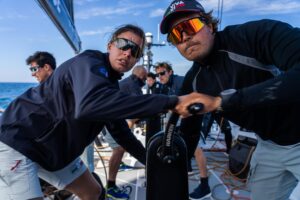
Gender equality in sailing: The Ocean Race aims for 50:50 split

The Ocean Race, a gruelling round-the-world sail race that takes place every three years, is aiming for a 50:50 split of women and men by 2030.
Organisers say the move aims for an equal number of men and women competing across the event, whether this is achieved through mixed crews or all-female teams.
Dee Caffari, the first woman to sail single-handed and non-stop around the world in both directions, two-time competitor of The Ocean Race and Chair of the World Sailing Trust, says: “We all naturally trust the people we are used to sailing with, so it is difficult to break into a team. The wind and waves don’t care who you are, male or female, you’re a sailor.”

All-female crew Team SCA. Photo courtesy of Rick Tomlinson/ Team SCA/ Volvo AB
The World Sailing Trust’s 2019 Strategic Review into Women in Sailing revealed that 80 per cent of women and 56 per cent of men think that gender equality is an issue in sailing, with 59 per cent of women, compared with 14 per cent of men, saying they had experienced gender discrimination.
Working together, The Ocean Race, The Magenta Project, PA Consulting and the World Sailing Trust say they are aiming to change perception and improve routes into the industry for women. The Ocean Race will create a roadmap for action, which will feature new and existing initiatives that will be supported by the collaborators.
“Female competitors in The Ocean Race include Olympic gold medallists and world-record breakers,” says Anne-Cécile Turner, sustainability director at The Ocean Race. “They are powerful role models and ambassadors, but for many, their journey to the top has been fraught with challenges, simply because they are female. Not only are women missing out on opportunities, the profession is also missing out on the skills, strength and talent that they bring to the table. Sailing can secure its reputation, and its future, by coming together as an industry. We need to build bridges, not work in silos.”

Organisers of the Ocean Race claim to be an industry leader in supporting women in the sport, with more females competing in the event than in any other sailing competition outside of the Olympics. The Ocean Race has been the only other major international sporting event where men and women compete on the same team on an equal basis, with 136 women competing in the race since 1973, including 12 in the first edition.
In the 2017-18 edition of the race, new rules were introduced that gave teams a major incentive to include women as well as men, a policy that will continue in the 2022-23 race and will see women participate with a meaningful role on every team.
Pictured left: Dee Caffari. Photo courtesy of Beau Outteridge
“The research that the World Sailing Trust conducted in 2019, showed some pretty stark figures on the state of gender equality in sailing,” says Caffari. “It will take leading events in our sport, such as The Ocean Race, to continue to turn the equality dial.”
Jonquil Hackenberg, chair of The Magenta Project, a charity dedicated to gender parity and diversity in competitive sailing, and head of sustainability at PA Consulting adds: “Sailing is one of the least diverse sports and this needs to change. This collaboration is a vital step towards that and has the potential to alter the face of sailing forever and make it a sport that others can turn to and learn from. The power of this collaboration is that it brings strengths to the fore, where strengths do not need to be physical. With a tangible set of recommendations and a collaboration whereby we at The Magenta Project can bring actionable pathways for aspiring ocean racers, the initiatives focus on the entire ecosystem of the sport, which is the only way to truly embed meaningful and sustainable change.”
The next edition of the Ocean Race will start on 15 January 2023. Both IMOCA and VO65 fleets are scheduled to depart from Alicante, on Spain’s Mediterranean coast, before undertaking the 31,000-nautical-mile circumnavigation, billed as the greatest challenge in sailing.
